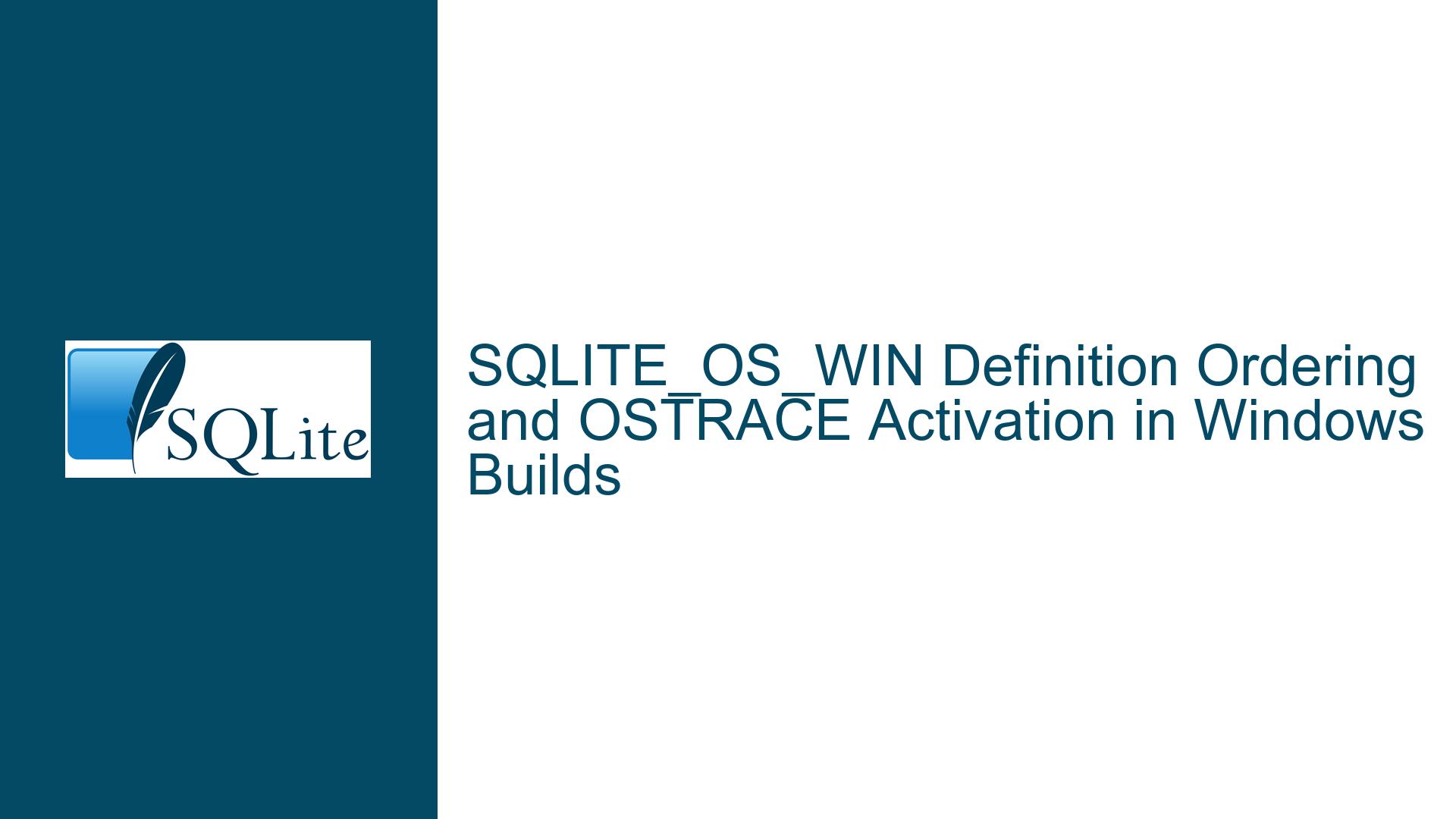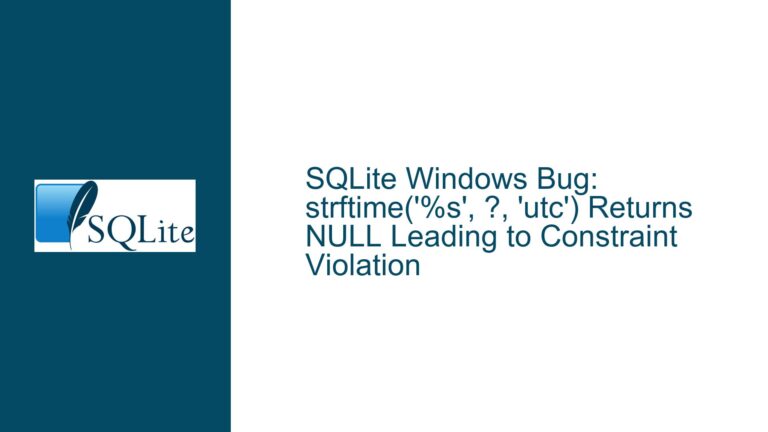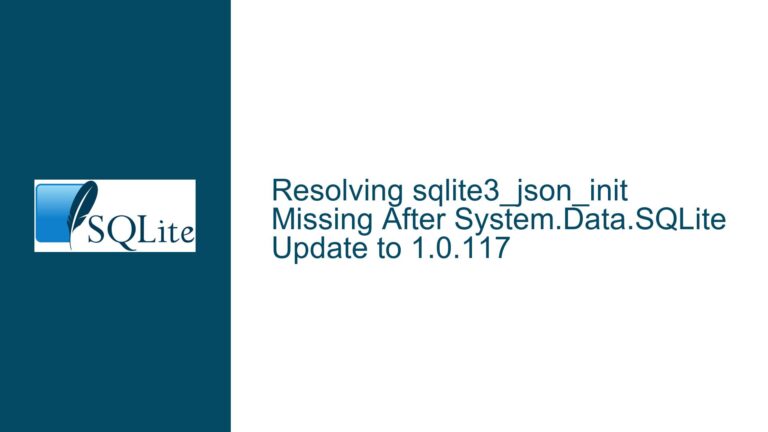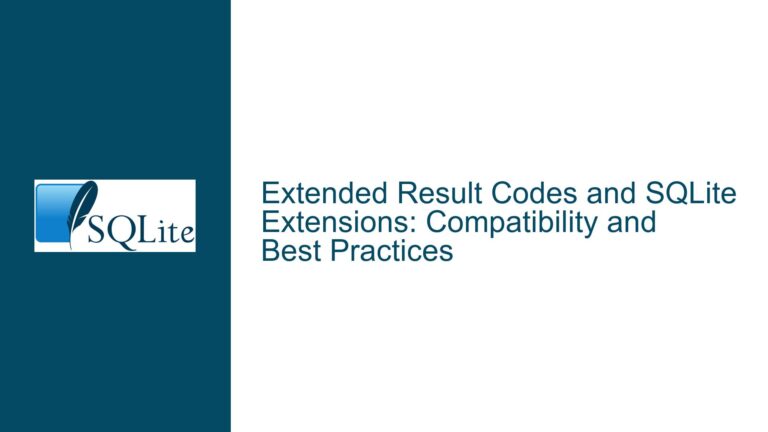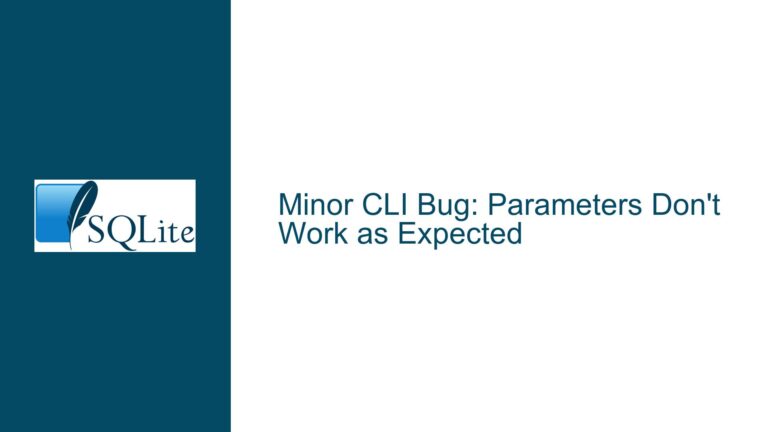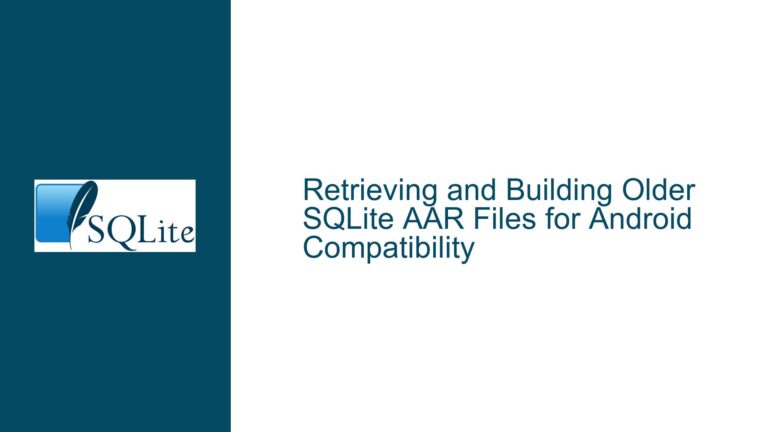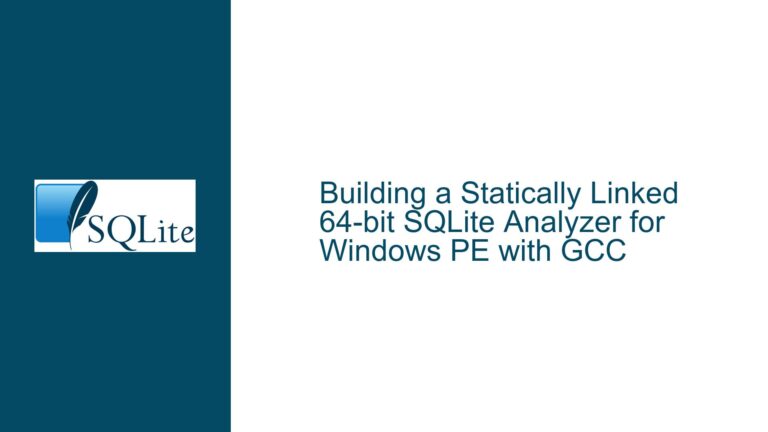SQLITE_OS_WIN Definition Ordering and OSTRACE Activation in Windows Builds
Issue Overview: SQLITE_OS_WIN Dependency in OSTRACE Activation Before Its Definition
The core issue revolves around the conditional compilation logic governing OSTRACE, SQLite’s diagnostic logging mechanism, in Windows environments. The OSTRACE macro relies on preprocessor definitions such as SQLITE_DEBUG, SQLITE_FORCE_OS_TRACE, or SQLITE_TEST to enable debugging output. However, the Windows-specific activation path introduces a dependency on SQLITE_OS_WIN, which is defined later in the SQLite amalgamation source file (sqlite3.c).
In SQLite versions 3.35.0 through 3.40.1 (and potentially later), the OSTRACE macro’s conditional compilation checks for SQLITE_OS_WIN before the amalgamation code defines it. The #if directive at line 13896 (as observed in 3.35.0) references SQLITE_OS_WIN to determine whether debugging output should be enabled when SQLITE_DEBUG is active. However, SQLITE_OS_WIN is not explicitly defined until line 16426, where platform detection logic assigns it based on the absence of SQLITE_OS_OTHER and the target operating system.
This creates a scenario where developers compiling SQLite directly into Windows projects—without using SQLite’s provided Windows makefiles (e.g., Makefile.msc)—may find that OSTRACE remains disabled even when SQLITE_DEBUG is defined. The root cause is the compiler’s inability to recognize SQLITE_OS_WIN during the initial evaluation of the OSTRACE conditions, leading to silent failures in enabling debugging features.
Possible Causes: Preprocessor Definition Ordering and Build System Assumptions
The problem stems from two interrelated factors:
Definition Ordering in the Amalgamation File
SQLite’s single-file amalgamation (sqlite3.c) organizes platform-specific definitions in a manner that assumesSQLITE_OS_WINwill be defined after its first usage in conditional checks. The platform detection logic (lines 16422–16428 in 3.35.0) definesSQLITE_OS_WINonly if the build targets Windows andSQLITE_OS_OTHERis not defined. However, this definition occurs thousands of lines after theOSTRACEmacro’s dependency onSQLITE_OS_WIN.Compilers process source files top-to-bottom, meaning that any reference to a macro before its definition will treat it as undefined. Consequently, the
#if defined(SQLITE_DEBUG) && SQLITE_OS_WINcheck evaluates to false during the initial pass, disablingOSTRACEunlessSQLITE_OS_WINis predefined externally.Reliance on Makefile.msc for Implicit Definitions
SQLite’s Windows build system (Makefile.msc) explicitly definesSQLITE_OS_WINvia compiler flags (e.g.,-DSQLITE_OS_WIN). This masks the definition-ordering issue because the macro is already defined before the compiler processes the amalgamation file. Developers who bypass the provided makefiles (e.g., by embedding SQLite into custom projects or using alternative build systems) encounter the problem because their build configurations do not replicate this explicit definition.The SQLite documentation does not clearly state that
SQLITE_OS_WINmust be manually defined when not using the provided Windows makefiles. This omission creates confusion, as developers assume the amalgamation’s platform detection logic will handle OS-specific macros automatically.
Troubleshooting Steps, Solutions & Fixes: Ensuring Consistent OSTRACE Activation in Custom Windows Builds
To resolve the OSTRACE activation failure in Windows builds that do not use SQLite’s makefiles, developers must ensure SQLITE_OS_WIN is consistently recognized during the OSTRACE macro’s conditional checks. Below are actionable steps to diagnose and address the issue:
Step 1: Verify Preprocessor Definitions During Compilation
Begin by confirming whether SQLITE_OS_WIN is defined when compiling sqlite3.c on Windows. Most compilers support flags to output preprocessor definitions. For example:
- MSVC: Use
/Pto generate a preprocessed file, then search forSQLITE_OS_WIN. - GCC/MinGW: Use
-dM -Eto dump all predefined macros.
If SQLITE_OS_WIN is missing, the compiler’s preprocessing phase will not include it, causing the OSTRACE logic to default to the #else branch.
Step 2: Define SQLITE_OS_WIN Explicitly in Build Configurations
Manually define SQLITE_OS_WIN in your compiler flags or build scripts. This overrides the amalgamation’s delayed definition and ensures the macro is available during the OSTRACE check.
Example for MSVC (Command Line):
cl -DSQLITE_DEBUG -DSQLITE_OS_WIN ...
Example for CMake:
add_compile_definitions(SQLITE_DEBUG SQLITE_OS_WIN)
Example for MinGW/gcc:
gcc -DSQLITE_DEBUG -DSQLITE_OS_WIN ...
Step 3: Modify the Amalgamation File (Advanced)
For long-term maintenance or custom SQLite forks, adjust the order of platform detection and OSTRACE-related conditionals in sqlite3.c:
- Move Platform Detection Earlier: Relocate the block defining
SQLITE_OS_WIN(lines 16422–16428) to a position above theOSTRACEmacro’s first usage (line 13896). - Guard Against Multiple Definitions: Ensure the relocated code does not interfere with other platform-specific logic.
Risks: This approach complicates future updates to the amalgamation file, as manual edits must be reapplied.
Step 4: Advocate for Upstream Fixes or Documentation Updates
Engage with the SQLite community to:
- Propose a Code Change: Submit a patch to reorder the platform detection logic or adjust
OSTRACEdependencies. - Improve Documentation: Request clarifications in SQLite’s documentation, explicitly stating that
SQLITE_OS_WINmust be defined for Windows builds not usingMakefile.msc.
Step 5: Validate OSTRACE Functionality Post-Fix
After applying fixes, verify that OSTRACE outputs debugging information:
Enable SQLITE_DEBUG: Ensure your build configuration defines
SQLITE_DEBUG.Implement a Test Case: Use
sqlite3OSTraceto trigger debug output.extern int sqlite3OSTrace; sqlite3OSTrace = 1; // Execute SQLite operations that should generate OSTRACE outputCheck Logs or Debug Output: Confirm that debug prints appear during execution.
Final Workaround: Use SQLITE_FORCE_OS_TRACE
If defining SQLITE_OS_WIN proves impractical, use SQLITE_FORCE_OS_TRACE to bypass the SQLITE_OS_WIN dependency entirely:
cl -DSQLITE_DEBUG -DSQLITE_FORCE_OS_TRACE ...
This activates OSTRACE unconditionally but may introduce unnecessary overhead in non-debug builds.
By systematically addressing the definition order mismatch and ensuring SQLITE_OS_WIN is available during preprocessing, developers can restore OSTRACE functionality in custom Windows builds of SQLite.
